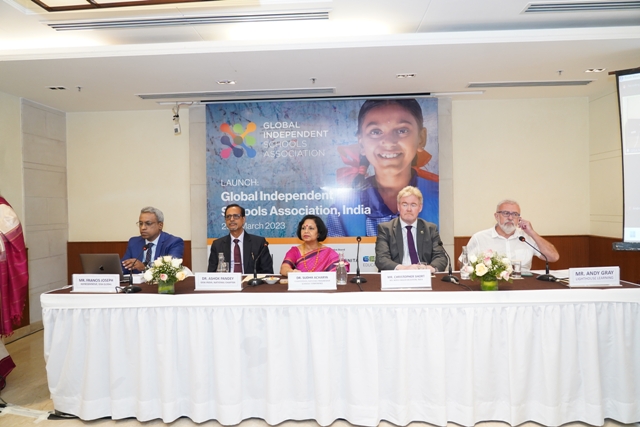
The 340,000 plus independent (private)schools across India were today urged to join forces with schools from across the world in the first worldwide representative body for the K-12 independent education sector – the Global Independent Schools Association (GISA). A vital aim of the organisation is in line with the National Education Policy (NEP) 2020, to improve education provision throughout the world, in all sectors, by sharing knowledge.
According to recent figures from the World Bank, over 50% of secondary school pupils and 13% of primary school pupils in India are enrolled in an independent institution – whether not for profit, profit, run by a private body such as a non-governmental organization, religious body, special interest group, foundation or business enterprise.
The new body, launched today, with an urgent call for knowledge sharing between the independent sector and governments to help improve education worldwide. Crucially, GISA hopes to make its voice heard as a valued partner in achieving SDG4: ensuring inclusive, equitable, quality education for all by 2030.
This global association seeks to co-ordinate, represent, and give a voice to the global K-12 independent education sector – filling a “representation void” of a sector that educates 350 million children around the world – including 52% of secondary school children in South Asia and 45% of primary school children in Latin America.
“I am delighted to represent Nord Anglia Education, India, and join other providers of international education in India to launch the GISA India Chapter”, said Christopher Short, MD Nord Anglia Education India.“GISA gives us an excellent platform to promote the benefits of international schools in India and highlight how we can work alongside the National system to promote high standards and educate the next generation of leaders”, he added.
GISA aims to become the “go-to” voice for the independent education sector, showcasing its impact and acting as a resource for the world’s governments and global institutions to tap into, talk to, and lean on in times of crisis. It will provide a forum for the sector to share its vast accumulated knowledge and expertise within the independent sector. At the same time, it aims to work with policymakers and governments worldwide to help raise standards in schools of every background, whether public, independent or third sector.
Some of the leading names in global K-12 independent education have united to form this new body. GISA’s Executive Board, which will shape its strategic direction, includes Andrew Fitzmaurice, CEO of Nord Anglia Education; Sunny Varkey, Founder of Gems Education; Nadim Nsouli, Founder, Chairman and CEO of Inspired Education; Frank Maassen; Group CEO of Cognita; Brian Rogove, Group CEO of XCL Education; and Dino Varkey, Group CEO of GEMS Education. The association launched with a call to action to attract members from around the world, whether they are a single classroom private school in a low-income country, a school run by a charity or foundation, or a school operating within a multinational chain.
GISA will enable its members to exchange knowledge, jointly develop resources, and benefit from access to advanced research and reports, as well as innovative workshops and exclusive events. Additionally, the association aims to organise an annual conference where policymakers, sector representatives, non- governmental organisations, and renowned thinkers will come together to engage in high-level discussions on accelerating the achievement of high-quality education for all.
Andrew Fitzmaurice, CEO of Nord Anglia Education and Chairman of the GISA’s Executive Board, said: “Independent schools are often centres of innovation that introduce new methodologies, pedagogic styles, and technologies. GISA members can provide considerable insight and best practice, which can be shared to benefit state and independent schools everywhere. From important areas such as supporting the professional development of teachers to the latest uses of technology in teaching and learning, we can make an even greater impact on education by working together.”
Speaking in support of GISA, Andreas Schleicher, Director of Education and Skills for the Organisation for Economic Cooperation and Development (OECD), said: “Getting the independent sector to raise its voice in service of the public good is hugely important. Tomorrow’s economy will be unforgiving for those without a strong education and skills for the future. Unless the independent sector joins others – governments, business, NGOs – to work out how we educate and skill up a new generation, valuable expertise will remain siloed, and solutions will be lost.”
“We are thrilled to announce the launch of GISA in India,” said Francis Joseph, India lead of GISA Global. “With India’srich history of academic excellence and cultural diversity, independent (private) schools in the country can play a critical role in shaping the next generation of leaders and innovators. The deep knowledge across India’s vast network of independent schools can play an important role in helping to improve global education. It is a key responsibility of private school operatorsto work together with governments and policy makers in the country”.
Francis Joseph is known in the Indian education sector for his work with the Government of Maharashtra in establishing a mother-tongue education board, namely Maharashtra International Education Board. He also worked with Brihanmumbai Municipal Corporation in establishing free-of-fees schools affiliated to CBSE/ICSE/Cambridge/IB Schools, as well as participating in various education policy decisions such as The Maharashtra Compulsory Teaching and Learning of Marathi Language in Schools Act, 2020.